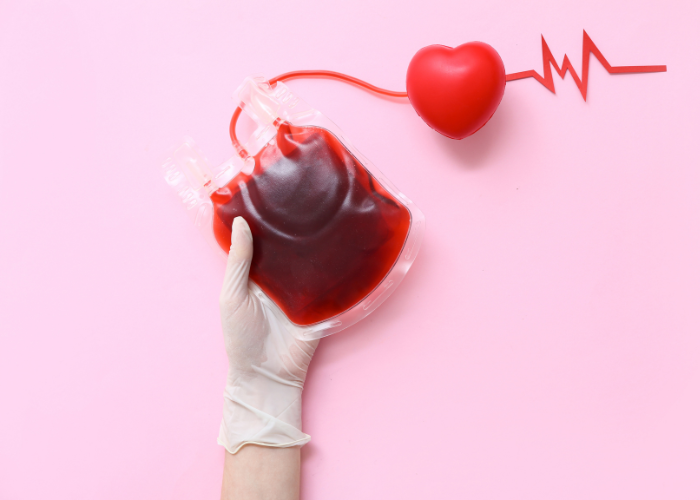IMANA NEWS
This World Blood Donor Day, Learn How to Donate
12 June 2025
 Did you know that someone needs blood every two seconds in the US? It’s a dire statistic, made worse by the fact that only about 3% of Americans donate. As a result, people who need emergency surgeries or suffer from long-term illnesses are often left anxious about their future. Blood donors are the only һope for these patients.
Did you know that someone needs blood every two seconds in the US? It’s a dire statistic, made worse by the fact that only about 3% of Americans donate. As a result, people who need emergency surgeries or suffer from long-term illnesses are often left anxious about their future. Blood donors are the only һope for these patients.
That’s why, every year on June 14, organizations and individuals from across the world celebrate World Blood Donor Day.
At the Islamic Medical Association of North America (IMANA) we take these dates seriously. Blood donations have a huge impact on our medical relief work, and we know how many more lives can be saved with a little more awareness.
In this guide to World Blood Donor Day, learn more about what you can gain from joining these illustrious ranks.
History of World Blood Donor Day
World Blood Donor Day was established by the World Health Organization in 2001, on the birthday of the late Austrian physicist Karl Landsteiner.
Among several other accomplishments Dr. Landsteiner was tһe first person to classify human blood into the types we know tһem as today — A, B, AB, and O. This allowed doctors to perform safer blood transfusions, saving countless lives in the process. For his work he was awarded tһe Nobel Prize for Medicine in 1930.
Blood Donation Eligibility Requirements
To ensure the safety of patients and donors, there are strict criteria deciding who is allowed to donate blood. With that said, there are several types of donations, each with different criteria. If you’re looking for a more detailed breakdown, check out the American Red Cross guide. But for a general overview, you must:
- Be over 17 years of age
- Weigh over 110 pounds
- Be in good health (normal blood pressure, temperature, etc)
- Not be on antibiotics
- Have not donated blood in the last two months.
Moreover, there are some more specific considerations that come into play. This includes any recent travels, tattoos and piercings, vaccinations, or long-term health conditions. An expert will be able to guide you through the specifics once you arrive at the appointment.
To prepare for the day, make sure that you get plenty of sleep the night before, eat a healthy meal before your donation, and drink enough water. Also make sure you alert the professional in advance of any medications that you may be on.
The Benefits of Donating Blood
The thought of giving blood may seem overwhelming to some, especially those with a fear of needles. But we assure you, it is completely harmless.
In fact, it may surprise you to learn that blood donation also has several benefits for the donor as well as the receiver. Consider these points:
It’s a Free Health Check-Up
On World Donor Day, doctors and medical professionals set up free donation clinics across the country. To donate blood here, you will be required to undergo a health screening, during which a professional will check your blood pressure, hemoglobin levels, body temperature, and more.
You will then receive a breakdown of your blood type, along with several insights into your overall health. The blood is also tested for diseases, helping thousands of Americans discover conditions they didn’t know they were living with. This is not a one-off occurrence either — here’s a detailed visualized breakdown of the numbers.
It Has Multiple Health Benefits
Blood donations are associated with several health benefits, some more clear than others. Many studies in the past have suggested that blood donation reduces the risk of cardiovascular disease, but others indicate that the results are not as cut and dry.
What most professionals do agree on, is that donating blood can slow down the aging process. Donations can reduces oxidants and increase the body’s antioxidant capacity. Donating blood may also reduce your risk of getting certain cancers, as it reduces iron levels in the body.
It Improves Your Mood
Beyond physical benefits, blood donation can also positively affect your mental health. Professionals have indicated that small acts of altruism, such as donating blood, can significantly boost moods. This small act could reduce stress, improve emotional balance, and even fight symptoms of depression in the process.
Plus, donating blood can connect you to a community of like-minded individuals — people who take action and stand in solidarity with those in need. For many repeat donors, the thought that their small gesture saved a life is the best reward.
Join IMANA’s Life Saving Efforts
This June 14, we encourage you to become part of that story. Whether it’s your first time donating, or you’re a repeat donor, we assure you, your contribution matters. So go ahead and make an appointment today.
While you’re at it, visit our website to learn how you can support our emergency medical relief efforts. As one of the largest faith-based non-profits in the world, we are always looking for volunteers, small donations, or any other support you can offer. Together we can make a huge difference, one drop of blood at a time.